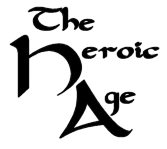Letter from the Editor
At long last, the eighth issue of The Heroic Age is ready, a particularly interdisciplinary collection focused on things maritime, rooted in one of our sponsored sessions at Kalamazoo. While we unfortunately lost some of our original contributors, we have gained new papers that extend the range of evidence considered.
This is best exemplified by our first article, in which William Sayers examines the linguistic evidence from Norman and Irish literary sources for the influence of Norse shipbuilding and seafaring techniques. Next we have Vicki Szabo, who reviews the textual traditions of whales. She brings the perspective of a zooarchaeologist who has worked on sites in Norse North Scotland, and asks how medieval perceptions of whales affected their use. Lemont Dobson points out that travel by sea was often faster than travel by land, and this simple geographic fact had a significant impact on the political "closeness" of kingdoms with access to the coast or major waterways, as illustrated by a study of Anglian Northumbria. And finally Craig Cessford examines the depiction of boats and other possibly marine symbols in Pictish art. His research provides clues about the importance of the sea for this poorly documented people.
I hope that long waiting has not spoiled the appetite. Blame for the lateness of this issue falls squarely on my own shoulders. Like so many early medieval archaeologists who are trying to hold academic positions in the United States, I have found it extremely difficult to continue research on medieval Europe when so many of my colleagues and students are much more interested in the desperately neglected and endangered archaeological sites on my own doorstep. (Not to mention the police who ask for my assistance when burials, both prehistoric and Colonial, are unexpectedly brought to light by development . . . not just once, but on two consecutive Februarys, not the best time for rescue excavation!)
While I have not yet given up the struggle, I am having to severely curtail my involvement in early medieval studies. And so it is with sorrow that I use this opportunity to say au revoir to The Heroic Age: as soon as this issue is finally on-line, I will be resigning from the editorial board. I have learned a lot over the years of my tenure, not only about areas of medieval studies beyond archaeology, but also about web-based publication and the challenges of getting people from five different disciplines to agree on a single citation style. Who knows when I will be at Kalamazoo again, but while I am excavating seventeenth-century Scots on the Eastern Shore of Maryland, my heart will still be in Dalriada.
Fare you all well, on whatever seas—
Elizabeth Ragan

